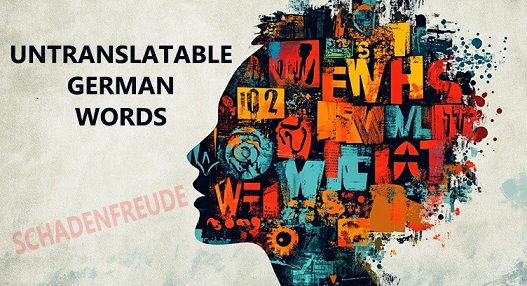
Words the World Wishes It Had
Every language has its quirks, but German might just be the master of invention when it comes to words that simply don’t translate. Ever longed for a place you’ve never been? Felt joy at someone else’s misfortune (be honest)? Wished for a single word that could explain the awkwardness of two people dodging each other on the street? Welcome to the world of untranslatable German words. These linguistic curiosities do more than add flair to conversation – they offer a glimpse into the German psyche, reflecting the country’s cultural values, sense of humor, and obsessive attention to detail. In this article, we’ll explore 15 of the most famous (and delightfully obscure) German words that defy direct translation. Along the way, you’ll gain insight into the German mind and perhaps even find the perfect word for a feeling you didn’t know had a name.
What Makes a Word “Untranslatable”?
An untranslatable word doesn’t mean it can’t be explained in another language – it means it has no exact one-word equivalent. These words usually pack multiple ideas, emotions, or cultural references into a single, efficient linguistic package. German is famously adept at this thanks to its love for compound nouns, where multiple smaller words combine into larger, often poetic concepts. This results in wonderfully expressive terms that English speakers often borrow outright.
15 Untranslatable German Words and What They Reveal
1. Fernweh – “Far-sickness”
Think of Fernweh as the opposite of homesickness. It describes a longing for faraway places, a powerful urge to travel and explore the unknown. It’s more than wanderlust – it’s an emotional pull toward distant lands.
- Cultural Insight: Fernweh reflects Germany’s deep literary and philosophical tradition, where romanticism and nature often intertwine.
- Comparable Concepts: Related to Portuguese saudade or the Japanese natsukashii, though still unique.
2. Schadenfreude – “Damage-joy”
A classic example, Schadenfreude refers to the pleasure derived from another person’s misfortune. It’s been adopted into English, but it remains inherently German in tone.
- Cultural Insight: Far from cruelty, it often reflects the release of social tension or envy – a complex emotional cocktail.
- Real-World Example: Laughing when a cocky contestant slips on live TV.
3. Fingerspitzengefühl – “Fingertip feeling”
This elegant term means having intuitive sensitivity or instinct, especially in delicate or tactical situations. It’s often used in politics, sports, or diplomacy.
- Cultural Insight: Embodies Germany’s admiration for precision, subtlety, and expert judgment.
- Comparable Concepts: Similar to “tact,” but more embodied and immediate.
4. Kummerspeck – “Grief bacon”
Yes, it’s real. Kummerspeck refers to the weight gained through emotional overeating, especially after heartbreak or stress.
- Cultural Insight: Germany’s culinary vocabulary is famously vivid. Here, food becomes a stand-in for emotional burden.
- Real-World Example: Late-night tubs of ice cream after a breakup.
5. Treppenwitz – “Staircase joke”
This word captures the perfect comeback or witty remark that comes to mind too late, usually after leaving the scene.
- Cultural Insight: Shows Germany’s philosophical bent and awareness of psychological nuance.
- Comparable Concept: The French have l’esprit de l’escalier – but Treppenwitz is more widely used in modern German.
6. Torschlusspanik – “Gate-closing panic”
Originally used to describe peasants rushing before city gates closed at night, it now refers to the anxiety of missed opportunities as time runs out – often associated with aging or big life decisions.
- Cultural Insight: Reflects a historically structured society with fixed timelines.
- Modern Usage: Feeling pressured to settle down or change careers before a self-imposed deadline.
7. Weltschmerz – “World pain”
Weltschmerz conveys a deep existential melancholy about the world’s shortcomings – a blend of philosophical dissatisfaction and emotional heaviness.
- Cultural Insight: Romantic-era Germans like Goethe and Heine captured this sentiment in their works.
- Comparable Concept: Think of a brooding teenager quoting Nietzsche.
8. Innerer Schweinehund – “Inner pig-dog”
That lazy, stubborn part of you that resists getting up early, going for a run, or finishing your taxes. We all wrestle with our inner pig-dog.
9. Backpfeifengesicht – “A face in need of a slap”
It sounds rude (because it is), but sometimes there’s just no other way to describe someone’s expression. Not nice – but undeniably German.
10. Drachenfutter – “Dragon fodder”
A gift given by a guilty partner (usually male) to appease their furious significant other. Think flowers after forgetting an anniversary.
11. Lebensmüde – “Tired of life”
Often used jokingly to describe someone taking bold or foolish risks. Standing up to your boss unprovoked? You must be lebensmüde.
12. Sitzfleisch – “Sitting meat”
The ability to sit still and work through something for hours – a quality admired in students, researchers, and bureaucrats alike.
13. Fremdschämen – “External shame”
The painful embarrassment you feel for someone else who clearly doesn’t realize how awkward they are being. Think secondhand cringe.
14. Waldeinsamkeit – “Forest solitude”
The feeling of peaceful solitude when you’re alone in the woods, embraced by nature and silence. Romantic, poetic, deeply German.
15. Zugzwang – “Move compulsion”
A term from chess describing the pressure to make a move when every option feels disadvantageous. Now used in politics, business, or everyday dilemmas.
Language as a Cultural Mirror
These words aren’t just vocabulary – they’re reflections of how Germans see the world. Sitzfleisch reveals a cultural reverence for perseverance. Treppenwitz shows the importance of timing and wit. Fingerspitzengefühl hints at a high value placed on interpersonal intelligence. German doesn’t shy away from big feelings. It builds bridges between inner emotion and public expression with stunning linguistic precision. If English feels like jazz, German is a well-orchestrated symphony – with some surprising punchlines.
Where You’ll Encounter These Words
In everyday life, untranslatable German words pop up in newspapers, talk shows, and small talk alike. You’ll hear Torschlusspanik in interviews about dating in your 30s. Drachenfutter might show up in sitcoms. Fernweh is a favorite among travel bloggers. Even if you don’t live in Germany, you’ll find many of these terms are perfect tools for describing modern life – whether it’s your personal battles with innerer Schweinehund, or the Fremdschämen you feel watching awkward TikToks.
Want more of Germany’s unique humor? Explore our guide to German Humor or get a chuckle from these Funny German Idioms.
One Language, Fifteen Worlds
Untranslatable German words give voice to feelings and situations we all recognize but rarely label. They’re efficient, evocative, and sometimes just hilariously specific. Learning them isn’t just an exercise in vocabulary – it’s a cultural deep dive into the German way of thinking, living, and laughing. Looking to expand your linguistic horizons? Dive into our German Language section or explore everyday wisdom in our collection of German Proverbs.
Related Articles:
Why German Compound Words Are So Long
German Proverbs and Their Meanings
German Idioms – Part 1: Everyday Sayings Explained
German Idioms – Part 2: More Quirky Expressions
German Idioms – Part 3: Insightful Sayings Uncovered
German Idioms – Part 4: Final Collection of Expressions
12 Food-Related German Idioms
Bizarre German Idioms and What They Mean







